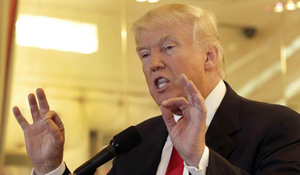Washington, Feb 14: Describing North Korea as a "big problem", US President Donald Trump today vowed to deal with it "very strongly", after the reclusive country carried out yet another ballistic missile test. "Not only internationally but when you come right here, we have - obviously, North Korea is a big, big problem, and we will deal with that very strongly," Trump told reporters during a joint news conference with the visiting Canadian Prime Minister Justin Treadue.
 Trump was responding to a question on greatest national security threat based on the intelligence briefings that he has been receiving for about a month now after he was sworn in as the 45th President of the United States on January 20. "Many, many problems," Trump said in response to a question.
Trump was responding to a question on greatest national security threat based on the intelligence briefings that he has been receiving for about a month now after he was sworn in as the 45th President of the United States on January 20. "Many, many problems," Trump said in response to a question.
"When I was campaigning, I said it's not a good situation. Now that I see it including with our intelligence briefings, we have problems that a lot of people have no idea how bad they are, how serious they are," said the US President. "We have problems all over the Middle East, we have problems just about every corner of the globe no matter where you look," Trump said.
Trump said people have no idea about the nature and intensity of the challenge both domestically and globally, which ranges from Middle East to terrorism. The US President said he had a great meeting this weekend with Prime Minister Shinzo Abe of Japan and got to know each other "very, very well," extended weekend, really.
"We were with each other for long periods of time and our staffs and representatives," he said. Trudeau said Canada and the US have been neighbours a long time and Canadians and Americans have stood together, worked together, at home and around the world. "We've fought and died together in battlefields in World War I and World War II, in Korea, in Afghanistan. But there have been times where we have differed in our approaches, and that's always been done firmly and respectfully," he said.
"The last thing Canadians expect is for me to come down and lecture another country on how they choose to govern themselves. My role, our responsibility, is to continue to govern in such a way that reflects Canadians' approach and be a positive example in the world," Trudeau said in response to a question.
Earlier, Trump thanked Canada's contribution to the counter-ISIS effort. "Now we continue to work in common and in common cause against terrorism and work in common cooperation toward reciprocal trade and shared growth," Trump said.





Comments
All the \problem\" countries you have invaded in the past are ruined now. They never attacked your country and yet you have \"problem\" with them."
Add new comment